Beloveds, I have written no less than fifteen almost-sentences to begin this message, and none have quite worked as intriguing or gentle entries into our topic today – which I am taking (finally) as a sign that it’s time for bluntness.
Anti-semitism is alive and well and living in the world – both around the globe and in our own communities. And as David Baddiel, author of Jews Don’t Count, observes, “antisemitism is a racism that often shows itself in codes and tropes and assumptions.”
Antisemitism is a racism.
And unlike the ways that Italian immigrants, and Irish immigrants, were eventually accepted as white in the United States, Jewish (culturally and/or religiously) immigrants have not experienced that same assimilation. The reasons are myriad – I refer you to historians and sociologists for that conversation – but the truth of the matter is that many people who are Jewish do face both discrimination, and a lack of allyship from progressives eager to help those who need a helping hand.
Unitarian Universalists have had times of being well-focused on this – from the Sharps during World War II and theologian James Luther Adams in the mid 20th century, and in various congregations, there has been awareness and even pushback against antisemitism.
Yet right now, we seem to focus a lot on anti-Black racism; it’s easy to see why, as that racism is baked into our nation’s story, and as a faith, we have had a moment of reckoning with our institution’s culture of white supremacy. That work is – and rightly so – important and ongoing.
Even when an event such as the Tree of Life shooting in Pittsburgh fills the news, our concern for antisemitism flares briefly but dies down as quickly. And generally, we do not lend the same focus to those who we don’t “think” need allies in the same way, perhaps because there is an underlying sense that it is not “real” racism. And, as Baddiel points out, there is often a resistance to classify antisemitism as racism, “and therefore of Jews as a race, or an ethnicity, has negative echoes, given a history in which Nazis insisted on that classification for obviously very bad reasons.”
Yet antisemitism is racism, and it exists.
And if we are to affirm and promote each person’s worth, and work for each person’s liberation from oppression, we have to remember that Jews are indeed one of the most persecuted groups of people in the world – and that a Jewish person’s liberation matters too.
This matters especially in Westchester County (and the surrounding areas people join us from) – there is a high concentration of culturally/religiously Jewish folk, and antisemitism is rampant. It is, as Baddiel points out, “the racism that sneaks past you.” Many of us don’t even realize it. Yet it is harmful – especially so when political conflicts flare up, such as the recent attack on Israel by Hamas, and people trot out all of the arguments about the complex history that has its roots in ancient struggles. Because in there is not just the antisemitism of Hamas – a group of people who do not believe Jews should exist – but the extensions of that belief that keep Jews firmly oppressed outside of the Middle East as well (see: the Charlottesville riots).
Let’s start this conversation here, at CUUC. Let’s find a way to make a vocal stand against antisemitism. Let’s learn about it, and examine the ways it sneaks into our discourse and our view of the world.
I recommend we start with a reading of Baddiel’s book, Jews Don’t Count. It’s not very long and is eye-opening. I should note that I read the original version when it came out in 2021; he updated it for North American audiences in 2022, and that’s the version we should read together.
I also imagine we might connect with local synagogues and see what kinds of support local groups might need. What else can we do? What else do we need – both within CUUC and in our community?
Let’s start the conversation.
